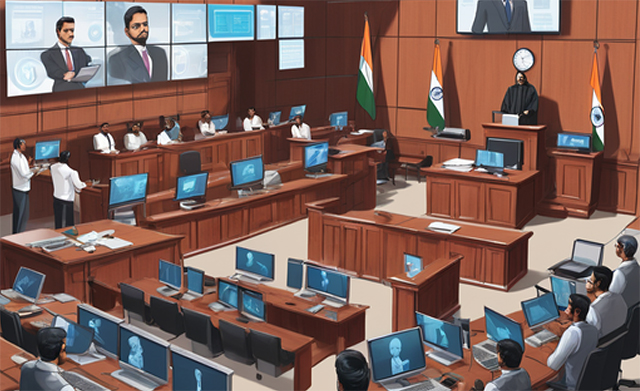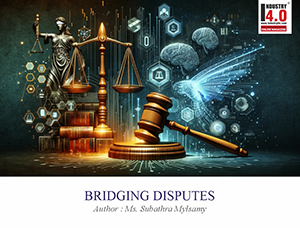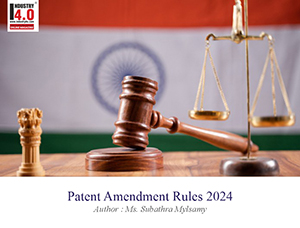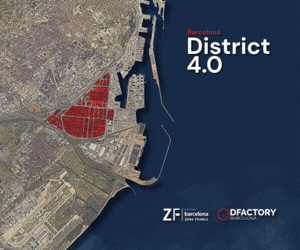Navigating India’s recent Legal Amendments : BNS, BNSS & BSA
Introduction
In 2023, the Indian government enacted three landmark laws to replace the country’s criminal legislature: the Bharatiya Nyaya Sanhita (BNS), the Bharatiya Nagarik Suraksha Sanhita (BNSS), and the Bharatiya Sakshya Adhiniyam (BSA). These new laws replace the colonial-era Indian Penal Code (IPC), the Code of Criminal Procedure (CrPC), and the Indian Evidence Act, respectively. This article provides an overview and analysis of these significant criminal law amendments.

The Bharatiya Nyaya Sanhita, 2023
The Bharatiya Nyaya Sanhita, 2023 (BNS) replaces the Indian Penal Code, 1860 (IPC) with an object to explicitly repeal the colonial law and “to streamline provisions relating to offences and penalties” While retaining the core structure of the IPC, the BNS introduces significant changes and has reduced the number of sections from 511 to 358. The BNS has introduced various new offences such as terrorist act, organized crime, snatching, negligence of medical practitioner leading to death, and emerging challenges such as mob lynching and hit-andrun incidents. By expanding the scope of criminal liability and prescribing deterrent punishments, the Sanhita aims to address societal concerns related to safety, accountability, and justice. Further, a new offence for having sexual intercourse on false promise of marriage, employment, promotion or by suppressing the identity etc. has been created in Section 69 of the BNS, 2023. This provision also has a deterrent effect.
The BNS has enhanced punishment for 33 offences such as causing hurt to deter public servant from duty, criminal breach of trust, dishonest misappropriation of property cheating etc. The Sanhita also consolidates and enhances the penalties for offences against women and children under Chapter V.
The Sanhita eliminates outdated and discriminatory provisions, including Section 377 (related to homosexuality), Section 309 (criminalizing attempted suicide) and Sec 497. This signifies a commitment within BNS to uphold human rights, reduction of the criminalization of personal choices, and align the legal framework with evolving societal values. However, the BNS still retains Adultery in Sec. 83 which penalises a man for enticing the wife of another man so that she may have intercourse with any person. Sedition has been deleted but a similar yet broader provision has been made pertaining to acts endangering the sovereignty, unity and integrity of India in Sec. 152. For the first time, ‘Community Service’ has been introduced as one of the punishments in Section 4 of the BNS, 2023. It is a reformative approach aimed at achieving ‘nyaya’ in the society. The BNS extends jurisdiction to criminalize the abetment of offenses committed outside India, addressing the increasing concern of transnational crimes. This is a necessary step in the context of globalization and the rise of crossborder criminal activities.
Thus, this new legislation is a progressive one aligning with the contemporaneous situation by bringing positive changes such as eliminating sedition as an offence, recognizing transgender in the definition of gender, and introducing stringent offences against women and children. However, it suffers from some drawbacks. The new provisions suffer from lack of clarity and vague words. The reduction in the number of sections has only led to amalgamation of sections. It fails to address several recommendations made by the Justice Verma Committee (2013) and Supreme Court on reforming offences against women. Further, sexual offences against men and transgender have not been dealt with which questions the coherence of the legislation. The sentencing process lacks clarity, with an absence of a clear principle behind the enhanced sentences and the addition of offences. The continuation of solitary confinement as a form of punishment is outdated in light of human rights standards and constitutional guarantees, particularly Article 21. Despite this, the legislation heralds a new era of justice system and the nation’s commitment to a fair, transparent, and inclusive legal system.

The Bharatiya Nagarik Suraksha Sanhita, 2023
The Bharatiya Nagarik Suraksha Sanhita, 2023 (BNSS), replaces the Criminal Procedure Code, 1973 (CrPC). This new law introduces several significant changes reflecting modern technological advancements and addressing long-standing issues in criminal law enforcement. The BNSS introduces significant changes such as electronic registration of First Information Reports (FIRs) and mandatory preliminary inquiries before FIR registration for cognizable offences. While these changes aim to leverage modern technology and ensure thorough investigations, they may inadvertently cause delays. The requirement for Zero FIRs, though designed to streamline reporting irrespective of jurisdiction, could potentially overburden the police force, complicating resource allocation and management.
The BNSS imposes specific timelines for various procedural actions to mitigate delays in investigation and trial processes. Although intended to expedite justice, these rigid deadlines may result in rushed investigations and judicial decisions, potentially compromising the quality of justice delivered. Completing committal proceedings within 90 days, framing charges within 60 days, and delivering judgments within 30 days of completing arguments, even with possible extensions, place immense pressure on judicial and investigative bodies.
Mandating forensic investigations for offences punishable by seven years or more and allowing all trials, inquiries, and proceedings to be conducted electronically aim to enhance the accuracy and efficiency of the legal process. However, given the current state of forensic infrastructure, particularly in smaller jurisdictions, and the significant financial implications, this mandate may not be feasible. Additionally, the move towards digitization, while progressive, exacerbates the digital divide, disadvantaging areas with limited internet access and potentially undermining equitable access to justice. Section 86 permits courts to seek international assistance for property attachment and forfeiture, addressing the issue of fugitive offenders.
This is a commendable step towards global cooperation in law enforcement. However, the expanded scope for collecting biometric evidence, including finger impressions and voice samples from individuals not under arrest, raises substantial privacy concerns and risks potential misuse by authorities. Section 107 grants Magistrates the power to attach properties identified as ‘proceeds of crime,’ including the issuance of ex parte interim orders. While this is a robust measure against criminal assets, it raises significant concerns regarding property rights and due process, as such ex parte actions can be taken without prior notification to the property owner.
Allowing police custody to be authorized in parts during the initial 40 or 60 days of judicial custody provides law enforcement agencies with greater flexibility. However, this flexibility, coupled with stricter bail conditions for undertrials involved in multiple cases, could lead to human rights violations and contribute to overcrowded prisons. The BNSS’s attempt to restrict bail aims to prevent the release of potentially dangerous individuals but must be balanced against the risk of infringing on personal liberties.
While the BNSS strives to modernize and streamline the criminal justice process, its implementation presents critical challenges.The introduction of electronic FIRs and strict procedural timelines risks rushed justice and potential delays. The measures for property attachment and expanded biometric evidence collection raise significant privacy issues. Mandating forensic investigations and digitizing trials, although progressive, face practical hurdles. Flexibility in police custody and stricter bail conditions could exacerbate human rights concerns and prison overcrowding. The success of the BNSS hinges on its balanced enforcement, safeguarding rights, and adapting to practical realities without compromising justice and fairness. BNS, BNSS, and BSA: Navigating India’s Recent Legal Amendments
The Bharatiya Sakshya Adhiniyam, 2023
The Bharatiya Sakshya Adhiniyam, 2023 (BSA) replaces the Indian Evidence Act, 1872 (IEA). While retaining many provisions of the IEA, the BSA introduces several significant changes to adapt to contemporary needs, particularly regarding electronic records and
evidence handling.
One of the most notable changes in the BSA is the reclassification of electronic records. While the IEA treated electronic records as secondary evidence requiring a certificate for admissibility, the BSA recognizes them as primary evidence. This shift acknowledges the growing prevalence and importance of digital information in today’s world, making it easier to admit electronic records in court without the cumbersome requirement of certification. However, this raises questions about the authenticity and security of electronic records, necessitating robust mechanisms to prevent tampering and ensure their reliability.
The BSA expands the conditions for secondary evidence to include cases where the genuineness of the document is in question. This expansion aims to cover more scenarios where secondary evidence might be necessary. Additionally, allowing oral evidence to be given electronically facilitates remote testimonies, reflecting an adaptation to technological advancements and potentially increasing accessibility to justice. However, the effectiveness of remote testimonies depends on the technological infrastructure and the ability to ensure the credibility of such evidence.
In joint trials, the BSA treats a confession by one accused as a confession against all, even if an accused has absconded or not responded to an arrest warrant. While this provision aims to streamline the trial process, it raises concerns about the fairness of implicating coaccused individuals based on the confession of one. This could potentially lead to wrongful convictions if not handled with due diligence.
The BSA maintains the IEA’s stance that confessions made to police officers are inadmissible, except for information leading to fact discovery if made in police custody. This provision faces significant criticism due to the potential for coercion and abuse in police custody, which could lead to false confessions. Despite efforts to safeguard against such misuse, the inherent power dynamics in police custody environments make this a contentious issue, demanding stringent safeguards to protect the rights of the accused.
The BSA’s modernization of evidence handling, particularly its recognition of electronic records as primary evidence, reflects a necessary adaptation to contemporary realities. However, the potential for misuse in coercive environments, particularly concerning confessions made in police custody, remains a critical concern. While the BSA introduces important reforms to facilitate evidence handling and remote testimonies, its success hinges on the implementation of stringent safeguards to prevent abuse and ensure the authenticity and reliability of electronic evidence. The balance between modernizing the legal framework and protecting individual rights is crucial for the BSA’s effective and fair application.

Conclusion
The Bharatiya Nyaya Sanhita, Bharatiya Nagarik Suraksha Sanhita, and Bharatiya Sakshya Adhiniyam of 2023 signify crucial reforms in India’s criminal justice system. These laws aim to modernize legal processes, incorporate technological advancements, and address contemporary criminal activities. However, they also present challenges, including potential delays, privacy concerns, and risks of misuse. The success of these reforms depends on balanced implementation, robust safeguards, and the protection of individual rights. Ensuring equitable access to justice, particularly in areas with limited resources, is essential for these legislative changes to achieve their intended goals of enhancing fairness and efficiency in the legal system.
About the author :

Ms. Subathra Mylsamy BA.MA.BL.LLM (UK)
Managing Partner
A.K.Mylsamy & Associates LLP

Ms. Subathra is an experienced Partner with a demonstrated history of working in the legal services industry. Ms. Subathra is skilled in International Law, Legal Assistance,Legal
Research, and Legal Writing. Ms. Subathra has done her Master of Laws (LLM) focused in International Business law from The University of Manchester.
Brief Profile of Ms. Subathra Mylsamy :
Ms. Subathra Mylsamy can be contacted at :
About A.K.Mylsamy & Associates LLP :
A.K.Mylsamy & Associates LLP [‘AKM’], is a distinguished Full-Service Corporate Law Firm celebrating its 60th year of practice.
At AKM, we offer a comprehensive range of services encompassing Litigation, Advisory, and Transactional expertise.Evolving our services to meet the needs of our clients, we’ve pioneered in corporate law as a one stop destination covering Commercial, and Civil Law, with a keen focus on Mergers and Acquisitions, Structuring, Recoveries, Insolvency & Bankruptcy, Direct and Indirect Taxes, handled by a seasoned team of former ‘Indian Revenue Service’ officers. Additionally, we excel in Contracts, Intellectual Property Rights to Technology laws, Cyber security , Data Privacy, Energy and Sustainability laws and many more.
A.K.Mylsamy & Associates LLP is a strong foundation of quality, competency, commitment and ethics, which have translated into the firm’s exponential growth and high reputation. Our team of experts, who have enviable experience in their related fields, provides efficient and prompt delivery of legal solutions that works best for your business.
A.K.Mylsamy & Associates LLP set very high standards of professionalism for ourselves and achieve the same with a meticulous, scientific approach and a high degree of professional integrity. We seek long-term relationships with clients and provide the best comprehensive solutions.
Team A.K.Mylsamy & Associates LLP
A.K.Mylsamy & Associates LLP Partners Profile
A.K.Mylsamy & Associates LLP can be contacted at :
LinkedIn | FaceBook | YouTube | Website | Website2
A.K.Mylsamy & Associates LLP News Letters :
” The Lawtree “ is a News Letter brought out in a simple and creative manner bringing out Legal Updates for the public awareness. ” The Lawtree “ has recently Published there 100th Edition.
![]()
“QIkcee” one minute read is an exclusive Intellectual Property Newsletter.
 Disclaimer: The above Article is for educational purposes only. Opinions or points of view expressed in this article represent the view of the author.
Disclaimer: The above Article is for educational purposes only. Opinions or points of view expressed in this article represent the view of the author.
Also read Ms. Subathra Mylsamy’s earlier article :

















